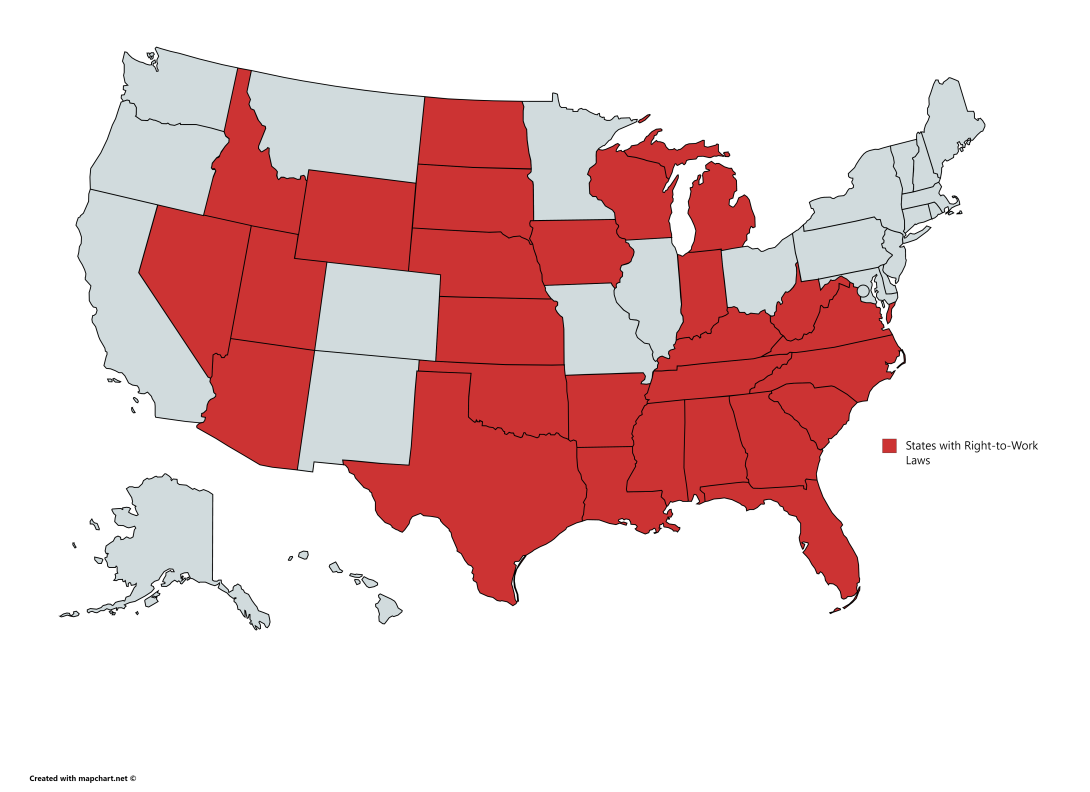Virginia shows challenge of ending right-to-work in the anti-union South

A total of 27 states, including every one in the South, have anti-union "right-to-work" laws. A recent attempt to repeal Virginia's failed. (Map by Ben Barber/Facing South.)
After a massive electoral victory last November in which they took control of the state House and Senate, Virginia Democrats have embraced a progressive agenda that includes raising the minimum wage, gun control measures, and election reforms.
Labor advocates also pressed Virginia's new blue majority to repeal the state's 1940s-era so-called "right-to-work" law, which weakens unions by requiring them to provide representation to non-member workers who refuse to pay dues. The state's business community strongly opposed repeal.
Such laws make it harder for working people to form unions and collectively bargain for better wages, benefits and working conditions. But proposals to repeal or scale back Virginia's right-to-work law are dead for the year after failing to gain traction in the legislature.
Today Virginia is among the 27 states that have right-to-work laws, most of them in the South, Midwest, and Southwest. Many of these laws were adopted in the 1940s and 1950s by segregationist politicians who sought to prevent the rise of industrial unions that organized workers of all races.
Virginia passed its right-to-work law in 1947 in response to a threatened strike by employees of Virginia Electric and Power Co., the predecessor of Dominion Energy. To suppress the potential strike, Gov. William Tuck, an avowed segregationist and union buster, threatened to draft the workers into the state militia. The conflict ended with no strike, but it motivated Tuck to propose the state's right-to-work legislation.
Today Virginia is also one of three states along with North Carolina and South Carolina that ban collective bargaining for public sector employees like firefighters, police, and teachers, according to the Center for Economic and Policy Research. Consequently, Virginia has a historically low rate of unionization.
According to the U.S. Bureau of Labor Statistics, union members accounted for just 4 percent of wage and salary workers in Virginia in 2019, compared to the national rate of 10.3 percent. The only states with lower unionization rates are the Carolinas.
'Preserving corporate power'
Last December, Virginia House Delegate Lee Carter, D-Manassas, introduced House Bill 153 to eliminate the state's right-to-work provisions. "The only way that you can make sense of the argument to keep right to work is by viewing it through a lens of preserving corporate power," Carter said at the time.
Although the legislation managed to pick up 15 co-sponsors, other Democrats thought it was too radical. Democratic Gov. Ralph Northam, for example, said repealing right-to-work was improbable and called on the party to focus on passing what he called "realistic" labor reforms. Sen. Joe Morrissey of Richmond also opposed the repeal, calling himself "a strong labor supporter" but saying Democrats "need to move forward prudently and cautiously when it comes to Virginia's fiscal stability and relationship with the business community."
After advancing through the House Labor and Commerce Committee with unanimous Democratic support, Carter's bill died in the Appropriations Committee after leaders declined to schedule a hearing for it.
In an attempt at compromise, Virginia Senate Majority Leader Dick Saslaw, D-Springfield, introduced Senate Bill 426, which would not fully repeal right-to-work but would institute "fair-use fees," allowing union contracts to require a non-union member in an organized workplace to pay partial union dues to cover the costs associated with the union's collective bargaining services. Rather than vote to pass the bill or kill it, however, the Senate Commerce and Labor Committee voted to allow the committee to reconsider it in the future.
Meanwhile in Tennessee, where just 5.5 percent of employed workers belong to unions, the state Senate this week approved a resolution to enshrine the state's right-to-work law into the state constitution. Joint Resolution 648, which passed with a vote of 24-5, was proposed by Sen. Brian Kelsey, R-Germantown, who says the Virginia repeal attempt motivated him to protect right-to-work in Tennessee.
Labor leaders condemned the move. "The average median household income is $6,500 less in right-to-work states, and workplace fatalities are more likely," said Billy Dycus, president of the Tennessee AFL-CIO. "Tennessee is at the top of the list for the number of minimum wage jobs."
The resolution now moves to the House, where Republicans have a 72-26 majority.
Tags
Benjamin Barber
Benjamin Barber is the democracy program coordinator at the Institute for Southern Studies.
